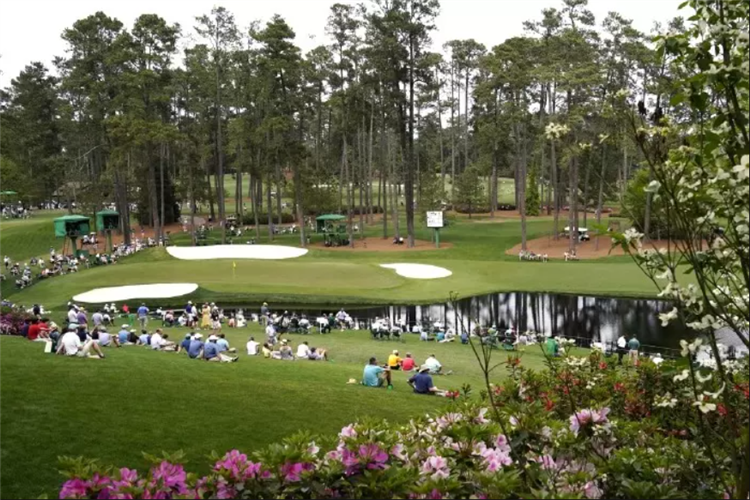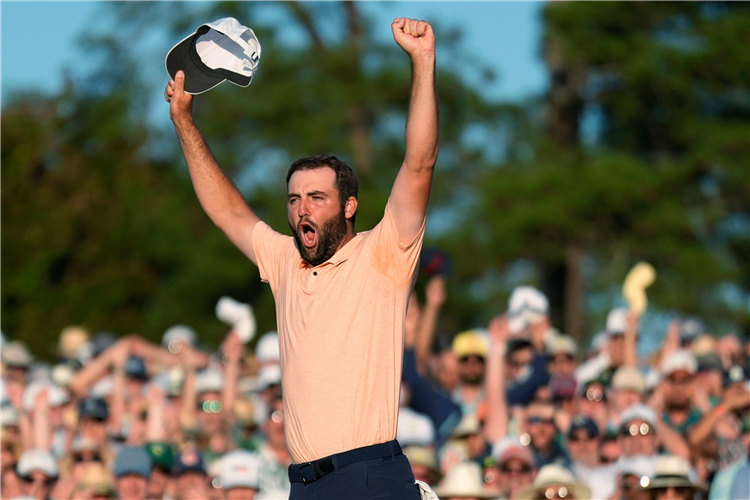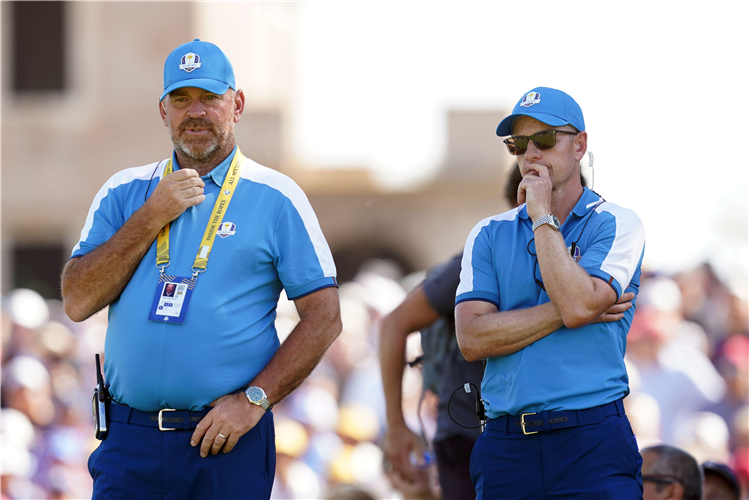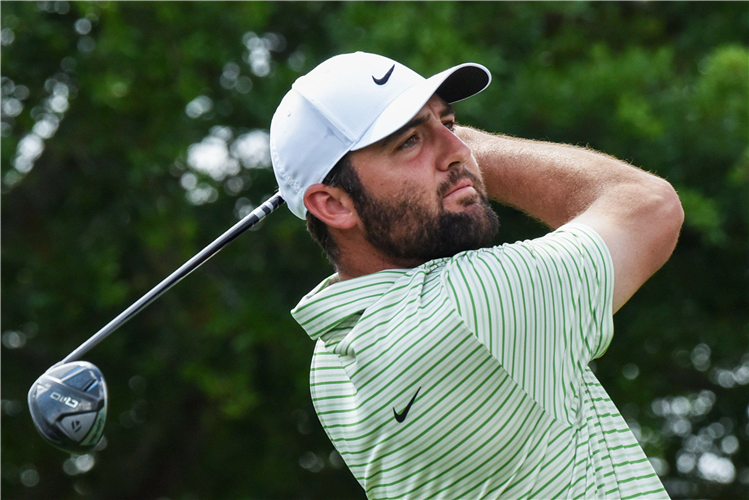The best golfers from all of the world's fractured tour circuit will converge on Augusta National in Georgia next week to compete for the US Masters, which means it's an ideal time to take a closer look at the challenges that golf's most famous 18 holes will be throwing at them.

The 88th Masters will take place at Augusta National from April 11-14, and below is a comprehensive guide to the course, ranking the holes from 1 (most difficult) to 18 (least difficult), based on scoring avarages during the 2023 tournament:
1st (Tea Olive), 445 yards, par 4:
- 2023 average: 4.187 (rank 7)
A deep bunker on the right of the fairway and trees both sides make for a daunting start, while long and left of the undulating green both spell big trouble. Played the hardest hole on the course in 2012 and again in 2017.
2nd (Pink Dogwood), 585 yards, par five:
- 2023 average: 4.637 (rank 18)
A new tee adds 10 yards to a hole which cost Padraig Harrington a nine in 2009, but Louis Oosthuizen memorably holed his second shot for an albatross in the final round in 2012. An important early birdie chance and the easiest hole in 2016, 2020 and 2023.
3rd (Flowering Peach), 350 yards, par 4:
- 2023 average: 4.036 (rank 13)
Shortest par four on the course but a pear-shaped green with steep slope in front allows for some wicked pin positions. Charl Schwartzel pitched in for eagle in the final round en route to the title in 2011.
4th (Flowering Crab Apple), 240 yards, par 3:
- 2023 average: 3.216 (rank 5)
The back tee – not always used – turns it into a beast, with the green sloping from back to front. Phil Mickelson took six in the final round in 2012 and finished two shots outside the play-off. Jeff Sluman's ace in 1992 remains the only hole-in-one.
5th (Magnolia), 495 yards, par 4:
- 2023 average: 4.327 (rank 1)
Jack Nicklaus twice holed his second shot in 1995 and Colin Montgomerie did it in 2000, but it is another devilishly difficult green. To clear the fairway bunkers requires a 315-yard carry and the hole was lengthened by 40 yards for 2019.
6th (Juniper), 180 yards, par 3:
- 2023 average: 3.097 (rank 10)
From a high tee to a green with a huge slope in it. Five holes-in-one – including Jamie Donaldson in 2013 – but Jose Maria Olazabal took seven in 1991 and lost by one to Ian Woosnam.
7th (Pampas), 450 yards, par 4:
- 2023 average: 4.209 (rank 6)
What used to be a real birdie chance has been lengthened by 35-40 yards, while trees were also added and the putting surface reshaped. A very narrow fairway and more bunkers – five – around the green than any other hole.
8th (Yellow Jasmine), 570 yards, par 5:
- 2023 average: 4.640 (rank 17)
The bunker on the right, about 300 yards out, pushes players left and from there it is harder to find the green in two up the steep hill. Still a good birdie chance and Bruce Devlin made an albatross in 1967.
9th (Carolina Cherry), 460 yards, par 4:
- 2023 average: 4.076 (rank 11)
The tee was pushed back 30 yards in 2002. The raised green, with two bunkers on the left, tilts sharply from the back and anything rolling off the front can continue down for 50-60 yards.
10th (Camellia), 495 yards, par 4:
- 2023 average: 4.133 (rank 9)
A huge drop from tee to green on this dogleg left and over all the years of the Masters the second most difficult hole. It was here that Rory McIlroy began to fall apart in 2011 with a seven, while Bubba Watson clinched the title in 2012 by making par in the play-off from the trees.
11th (White Dogwood), 520 yards, par 4:
- 2023 average: 4.276 (rank 3)
The start of Amen Corner. Toughest hole in 2011, 2014, 2015 and 2018 and extended by 15 yards in 2022. Best remembered for Larry Mize's chip-in in 1987 and Nick Faldo's back-to-back play-off wins.
12th (Golden Bell), 155 yards, par 3:
- 2023 average: 3.065 (rank 12)
Probably the most famous par three in golf. Narrow target, water in front, trouble at the back, it has seen everything from a one to Tom Weiskopf's 13 in 1980. Defending champion Jordan Spieth took seven in the final round in 2016 in a dramatic back-nine collapse and Tiger Woods made 10 in the final round in 2020.
13th (Azalea), 545 yards, par 5:
- 2023 average: 4.738 (rank 15)
The end of Amen Corner. Massive dogleg left, lengthened by 35 yards for 2023, with scores ranging from Jeff Maggert's albatross in 1994 to Tommy Nakajima's 13 in 1978. Sergio Garcia saved par after a penalty drop from a bush in 2017, went on to beat Justin Rose in a play-off and named his first child Azalea 11 months later.
14th (Chinese Fir), 440 yards, par 4:
- 2023 average: 4.179 (rank 8)
The only hole on the course without a bunker, but three putts are common on the wickedly difficult green. Course record holder Nick Price took eight here in 1993, while Mickelson holed his approach en route to his 2010 victory.
15th (Firethorn), 550 yards, par five:
- 2023 average: 4.656 (rank 16)
Often a tough decision whether to go for the green in two across the pond on the hole where Gene Sarazen sank his 235-yard four-wood shot for an albatross in 1935. There have also been three 11s here and the hole was lengthened by 20 yards in 2022.
16th (Redbud), 170 yards, par 3:
- 2023 average: 2.964 (rank 14)
Woods' memorable chip-in in 2005 came the same year as 73-year-old Billy Casper's 14, while Harrington, Ian Poulter, Shane Lowry and Tommy Fleetwood are among the players to record holes-in-one.
17th (Nandina), 440 yards, par 4:
- 2023 average: 4.255 (rank 4)
The famous Eisenhower Tree was removed after suffering storm damage, making for an easier tee shot on the hole Rose double-bogeyed when one off the lead in 2007. Nicklaus birdied here to take the lead as he won his 18th major in 1986.
18th (Holly), 465 yards, par 4:
- 2023 average: 4.300 (rank 2)
The drive was made much harder when the tee was moved back 60 yards in 2002 and 2023 champion Jon Rahm failed to reach the fairway in the final round after pulling his drive into the trees. The fairway bunker from which Sandy Lyle got up and down to win in 1988 is now 300 yards away.








